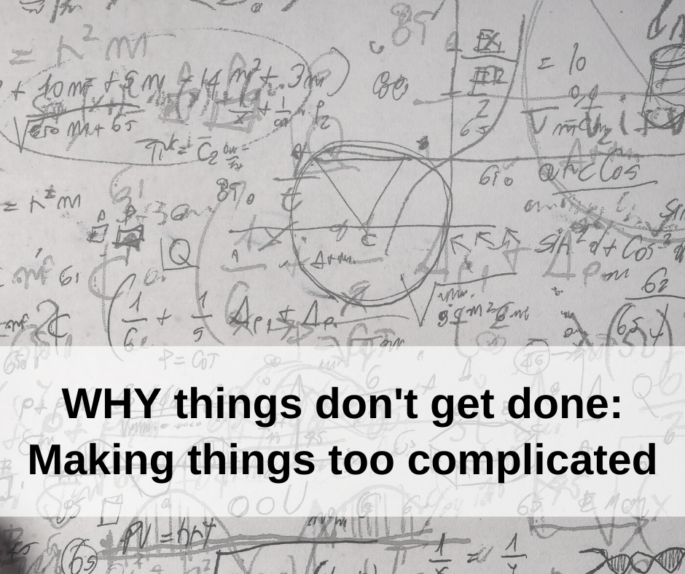Welcome to Part Five in the WHY things don’t get done series. (Part 1, Part 2, Part 3, Part 4)
Last week we talked about constantly reworking.
This week we’re talking about a similar topic: Making things too complicated.
One way we make things too complicated is by putting overly complex solutions together. The question is: Do you really need it to be that complicated and elaborate? You can always add layers to it after you know the basics work.
An example of this is a very long sales pipeline (they by this, then I’ll sell them this, and then this and then this, and THEN they’ll become private clients). If each piece is tested and converts for you, great. The problem comes in when everything’s new. Then if anything goes wrong in the process, everything breaks down.
In this example, start with what you ultimately want to be selling and work out the messaging and marketing for it. After you have that down, you can begin adding other layers.
Or your solutions might be overly complicated because you don’t have enough of the pre-work done. For example, don’t create a system that relies on you having an appointment scheduler and prevents you from adding appointments to your calendar until you do.
I’ve seen clients not set up 1-1’s or sales calls with people because they were researching scheduling tools. Or they’d picked one and were lost in the details of getting it set up. Their time would have better been spent reaching out personally to people to get appointments on their calendar and creating a simple system around doing it manually. There are two main benefits of this.
- They start getting appointments/meetings on their calendar
- They learn what’s important to them in this process which makes choosing and setting up a scheduling tool easier
When we overcomplicate things and spend too much time putting together the perfect system, it feels like we’re being proactive and productive in our business. But instead, we’re avoiding the things that move us closer to the results (aka clients and income) we want in our business.
The last example of this is overthinking an email or conversation. Perhaps it’s a follow-up email or call. Or maybe it’s asking someone to have a 1-1 with you. Or something else. Whatever it is, we can get lost in trying to find the perfect wording or feel like we’re being a bother, or create any other story in our head that stops us from moving forward because we’re overthinking it.
So, take a step back this week and do a quick review for where you’re making something too complicated instead of doing a more straightforward task and moving forward.
If you prefer listening/watching, you can catch this on YouTube or in my free FB group.





